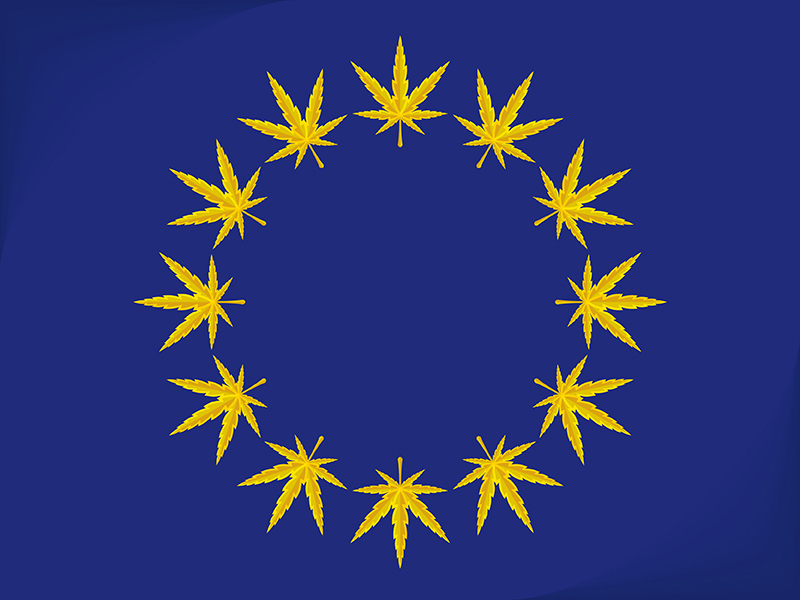“The construction of Europe is an art. It is the art of the possible” – Jacques Chirac
The European Union is looked at as a magical creation, highlighting the beauty of diplomacy. It’s a shared idea that the majority of European countries all unite behind. This unity can materialise in the form of laws, civil rights, taxations and job prospects. However, whilst the world is beginning to turn their attention to cannabis and see it in a different way, one would assume that the EU would be the first to take over this market. But, it hasn’t really happened. The USA and other nations or continents have proved to be far more progressive towards cannabis than Europe has. So why has this happened? What is truly wrong with the EU cannabis market? And is it all really so doom and gloom? Let’s take a look.
The EU catches up slowly, just barely having increased the legal level of THC allowed in hemp. If you want leniency and products, you’ll have to look across the pond. Make sure to subscribe to The THC Weekly Newsletter for deals on legal cannabis products, as well as all the latest news and industry stories. Also save big on Delta 8, Delta 9 THC, Delta-10 THC, THCO, THCV, THCP & HHC products by checking out our “Best-of” lists!
What is the European Union?
In 1951, many major European countries came together to try and find a peaceful pact after two bloody wars, which had killed millions. What was then referred to as the Schuman Declaration, later became the European Economic Community in 1957 and then the European Union in 1992. Now, the EU contains 27 European countries – which the UK is now longer part of. However, for the basis of this article, we will include the UK because their exit is too recent to show any separation from the rest of Europe when it comes to the cannabis market.
“Today, hundreds of millions dwell in freedom, from the Baltic to the Adriatic, from the Western Approaches to the Aegean. And while we must never take this for granted, the first purpose of the European Union – to secure peace – has been achieved and we should pay tribute to all those in the EU, alongside Nato, who made that happen.” – David Cameron, Former prime minister of the UK
Not only was the European Union made to end any potential future world wars, but also to create a single market. The EU allows selling and buying between European countries to be easy, with few limitations and embargos. In addition, travelling and working in neighbouring nations is made easier – which promotes the idea of sharing workforces and expertise across borders. The ideas and concepts behind the EU are magical, but the way in which they’ve been handled in reality have left many smaller nations to feel hard done by.
EU and Cannabis Market
The EU cannabis market is a tricky one to analyse. You might be thinking: ‘why are we analysing it at all? Surely each country is different with its own laws on cannabis?’. Well, you’d be right in a sense. Each nation in Europe does have its own cannabis laws and regulations – some more progressive, some more strict. However, whenever a country shifts the window of expectation in Europe, the other neighbouring nations react. This is of course because no action goes unnoticed, especially with the many EU meetings and conversations that take place. The ideal is that the continent moves forward as one in almost all decisions. The pact of the EU lays deep, and therefore there are trends that begin to occur when it comes to legalization and policy. That means that if enough major European countries decided to legalize recreational cannabis, it would be likely that the rest would follow.
However, the year is 2022, and that has not happened. Whilst the majority of countries in Europe may have legalized medical cannabis, recreational cannabis is majorly illegal throughout the continent. CBD products containing no more than 0.3% THC are legal, but any products with THC content above this is mostly illegal. The Netherlands, though it seems like a drug-utopia, has never officially legalized cannabis. It is simply decriminalised for personal use. Rather than the Netherlands becoming an example for the rest of Europe, it’s simply become a drug-related theme park where hungry Europeans can flood to smoke themselves to oblivion.
Another minor cannabis highlight of Europe is Luxembourg, which in 2021 became the first European nation to legalize the cultivation of cannabis. However, again, the impact of this is still yet to be seen. In fact, the only nation in Europe that has officially legalized cannabis in Europe is Malta, which is the smallest nation in the EU. As you can imagine, the smaller nations have less impact and influence over the proceedings of the larger countries. These powerful nations are: Germany, France, Italy, Spain and – for the basis of this article – the UK. None of these 5 pivotal countries have fully legalized cannabis.

The Pharma Letter states that:
“Europe’s legal cannabis market is predicted to reach a high of 3.2 billion euros by 2025. The European cannabis market is forecast to grow with a compound annual growth rate (CAGR) of 67.4% to reach 3.2 billion euros ($3.75 billion) by 2025, a new report has found”
Whilst this seems like a growing market with huge signs of potential, it must be compared to other places. For example, the USA. Statista writes that:
“In the United States, sales of legal recreational cannabis are expected to reach an estimated 25 billion U.S. dollars by 2025. Legal marijuana sales are forecast to increase steadily with each consecutive year.”
As you can see, the difference in expectation is rather staggering. For reference, 3.2 billion euros is around 3.7 billion dollars. In addition, it’s worth mentioning that the population of Europe is 750 million, whereas the population in the USA is 330 million. Therefore, there’s far more customers in the EU market, yet they still fall short of America by quite an amount. To make matters worse, even Canada’s legal cannabis market is predicted to reach a superior worth of 8.2 billion dollars by 2026. So what’s wrong with the EU cannabis market? Well, to understand why the cannabis market in Europe has yet to reach its full potential, we must look at the major countries in the EU and how they’ve, together, stalled any real progress.
Germany
- Medical Cannabis: Legal
- Recreational Cannabis: Decriminalised
Some would call Germany and Angela Merkel the real leaders of the EU. They are the most powerful economy, and do perhaps have the greatest influence. In fact, Germany constitutes over half of the EU cannabis market. Germany legalized medical cannabis in 2013. However, they recently decrimanlized ‘small quantities’ of cannabis for personal use in most places. It’s important to mention that decriminalisation is not the same as legalization. That might sound obvious, but the reason it’s important to state is that the act of cannabis legalization is a far more bold and wide-spreading message than the act of decrimanlization. When a big nation decides to legalize cannabis, the whole world turns to look. However, things may be starting to change in Germany. The New York Times wrote:
“Germany’s new government announced that it would legalize recreational cannabis for adults in its coalition contract presented in October. Although no bill or official schedule for a law exists yet, experts believe one will be passed within the next two years.”
When or if this does end up happening, it could be the major moment that changes the EU cannabis market forever. Let’s wait and see.
Italy
- Medical Cannabis: Legal
- Recreational Cannabis: Decriminalised
Italy legalized medical cannabis in 2013. In 2019, Italy decriminalised the growing of a small amount of cannabis for personal use. Again, the act of decriminalising a small amount of cannabis use has yet to affect the cannabis market. This is because the act of decriminalization has not allowed for shops selling THC cannabis to exist. It’s these shops or coffee shops or dispensaries that will improve the EU cannabis market a great deal.
France
- Medical Cannabis: Legal but not easy to get
- Recreational Cannabis: Illegal
France is known to have one of the least progressive cannabis situations in Europe. Whilst medical cannabis is legal, it’s hardly ever prescribed and incredibly hard to get ahold of. Medical cannabis is usually the first step on the cannabis legalization journey, and France is yet to even master that. The one minor silver lining came in 2018 when the government passed a law reducing the penalty and fine of possession to 200 euros. Still a bit steep though, isn’t it?
Spain
- Medical Cannabis: Legal
- Recreational Cannabis: Decriminalised
In Spain, cannabis is decriminalised for cultivation and personal use at home, but not in public. This led to a major culture of cannabis clubs in Spain, which allowed people to become members and enjoy consuming cannabis inside the building. There are thought to be around 400 of these in Spain, but they are constantly under threat of closure. These cannabis clubs are really treading the line of legality. However, it’s this line that will need to be tested if any real change is going to happen in Europe. In addition, it’s definitely going to take a larger nation in the EU to cause this shift of opinion.
UK
- Medical Cannabis: Legal
- Recreational Cannabis: Illegal
The UK legalized medical cannabis in 2018 but have yet to show signs of decriminalising THC cannabis. In addition, medical cannabis is still very hard to get a hold of in the UK. Wiley Clinical Health Care writes:
“The number of patients who have received NHS prescriptions for licensed cannabis medicines is estimated to be in the low hundreds”
The act of legalizing or decrimanlizing cannabis for personal use in the UK seems quite far away. Especially with the current Conservative government who would look weak to their supporters if they were to show signs of drug leniency. The issue with the UK, in particular, is that it’s very old fashioned in its ways and in its beliefs. It’s this conservatism and small-mindedness that ended up leading to the UK leaving the EU in 2019.
Conclusion
The EU cannabis market is making slow progress, there’s no doubt about that. However, the real highlights are coming from smaller nations like the Netherlands, Malta and Luxembourg, rather than from the larger EU nations like Germany. The issue is that each country in the EU have their own history, their own laws and their own people to please. The EU cannabis market has the potential to reach the heights of the US and Canada and, perhaps, one day surpass them. But this won’t happen until the major EU nations decide to take the plunge of full-scale legalization. But when will this happen? Well, if Germany decides to take the leap of faith, then perhaps sooner than we think.
Welcome! Thanks for joining us at CBDtesters.co, your one-stop-shop for the most important and thought-provoking cannabis and psychedelics-related news around the world. Check us out daily to stay aware of the ever-changing world of legal drugs and industrial hemp, and sign up for The THC Weekly Newsletter, to ensure you never miss a single story.
Disclaimer: Hi, I’m a researcher and writer. I’m not a doctor, lawyer, or businessperson. All information in my articles is sourced and referenced, and all opinions stated are mine. I am not giving anyone advice, and though I am more than happy to discuss topics, should someone have a further question or concern, they should seek guidance from a relevant professional.









